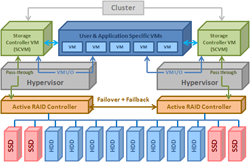StoneFly Incorporates HGST FlashMAX Enterprise SSDs
In USS hyper-converged appliance
This is a Press Release edited by StorageNewsletter.com on November 14, 2014 at 2:52 pmStoneFly, Inc., a supplier of SAN systems and a wholly-owned subsidiary of Dynamic Network Factory, Inc. (DNF), integrated HGST, Inc.‘s FlashMAX II enterprise SSDs in its flash-based version of the USS Hyper-Converged appliances.
USS Hyper-Converged Appliances take a different and much simpler approach to converged architecture by incorporating local DAS for faster performance and flexibility. Each node in a new StoneFly cluster includes flash-based storage to deliver massive IO/s for performance as well as enterprise HDD drives for low-cost high-capacity storage adhering to the principles of software-defined solutions.
The USS solution is both simple and advanced compared to traditional datacenter infrastructures. Each volume can be provisioned as iSCSI, FC, or NAS (CIFS/SMB and NFS). Its hypervisors allow multiple VMs to run on a single physical host and mediate all I/O operations including read and write requests to centralized NAS and SAN storage arrays, which are typically used to provide shared storage for all of the VMs.
StoneFly now implements all control logic as a software-based service running on FlashMAX II PCIe enterprise SSDs. Virtual storage controller(s) run on each cluster node improving scalability and resilience, while preventing performance bottlenecks since the storage and control logic is now local to the guest VMs.
“We are bringing out the next generation of hyper-converged software-defined virtual infrastructure into the marketplace at the highest IO/s per dollar,” said Mo Tahmasebi, president and CEO, StoneFly.
Expensive centralized storage or dedicated storage networks are no longer needed since the distributed file system for StoneFly’s NAS aggregates local storage across all of the nodes. There is no metadata database to limit the quantity of USS nodes participating in the NAS cluster allowing it to expand (scale out). USS appliances use a hash-based algorithm in each node to accomplish this task. As a result, USS appliances do not experience the latency issues that are associated with competing NAS cluster solutions that do utilize metadata databases.
StoneFly’s software allows users to create a single storage pool that can be partitioned into one gigantic NAS volume (single namespace) or several smaller volumes and these data stores are then presented to the hypervisor. These volumes are Posix-compliant for integration with any applications requiring this capability.
USS appliances can begin with a single node configuration and then nodes can be added in increments from 2U (12 drive bays) to 4U (24 drive bays). Each appliance can be scaled up to support a total of 256 drives per node. Cluster nodes and their expansion nodes can be added one at a time with zero downtime. This provides a time to value deployment of under 30mn with no disruption to ongoing operations.














 Subscribe to our free daily newsletter
Subscribe to our free daily newsletter

